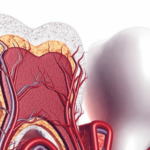
Dental implants have revolutionized modern dentistry by offering a durable and natural-looking solution for replacing missing teeth. Composed of titanium posts surgically inserted into the jawbone, dental implants serve as sturdy foundations for artificial teeth, bridges, or dentures. Understanding the various types of dental implants and their specific applications can help patients make informed decisions about their oral health.
Types of Dental Implants
- Endosteal Implants: These are the most commonly used dental implants. Endosteal implants are surgically inserted into the jawbone, where they integrate with the surrounding bone tissue. After the gums have healed, a second surgery is performed to connect a post to the original implant. This post protrudes through the gumline and serves as the anchor for an artificial tooth (crown), bridge, or denture. Endosteal implants are versatile and can support single crowns, bridges spanning multiple teeth, or full dentures, making them suitable for most patients with adequate bone density.
- Subperiosteal implants are positioned on or above the jawbone, nestled beneath the gum tissue, unlike endosteal implants. A metal framework is positioned on the jawbone, and as the gums heal, the framework becomes fixed. Posts attached to the framework protrude through the gums to hold artificial teeth securely in place. Subperiosteal implants are beneficial for patients who have shallow jawbones or insufficient bone density to support endosteal implants. They provide a stable alternative to traditional dentures without the need for bone grafting procedures.
- Zygomatic Implants: Zygomatic implants are a specialized type of dental implant used in cases where the patient lacks sufficient bone volume in the upper jaw for traditional implants. Instead of anchoring into the jawbone, zygomatic implants are inserted into the zygomatic (cheek) bone. This innovative approach bypasses the need for bone grafting by utilizing the denser bone structure of the cheekbone to support the implants. Zygomatic implants can support full-arch restorations, offering a reliable solution for patients with significant bone loss who seek stable and permanent teeth replacements.
Uses of Dental Implants
- Single Tooth Replacement: Dental implants are frequently used to replace individual missing teeth without affecting adjacent teeth. A single implant is surgically embedded into the jawbone, supporting a custom-made crown that seamlessly integrates with the patient’s natural teeth. This method preserves neighboring teeth and provides a stable, long-lasting solution for restoring dental function and aesthetics.
- Implant-Supported Bridges: For patients missing multiple adjacent teeth, implant-supported bridges offer a secure and durable alternative to traditional bridges or partial dentures. Multiple implants are strategically positioned along the jawline to support a custom-designed bridge that spans the gap left by missing teeth. Implant-supported bridges distribute chewing forces evenly across the implants and adjacent natural teeth, promoting oral health and stability.
- Implant-Supported Dentures: Conventional dentures can be uncomfortable and may slip while eating or speaking, affecting confidence and oral function. Implant-supported dentures anchor directly to dental implants embedded in the jawbone. Typically, four to six implants per arch provide stable support for a full set of dentures. This option enhances comfort, stability, and chewing efficiency, allowing patients to enjoy a natural-looking smile and improved quality of life.
- Full Mouth Reconstruction: In cases of extensive tooth loss, decay, or trauma, full mouth reconstruction using dental implants offers a comprehensive solution for restoring oral health and function. The treatment plan may include a combination of implant-supported crowns, bridges, or dentures to rebuild the entire dental arch. Full mouth reconstruction with dental implants not only restores aesthetics but also enhances bite alignment, facial structure, and overall oral well-being.
Summary
The selection of the appropriate dental implant type depends on several factors, including the patient’s oral health status, bone density, and specific treatment goals. A thorough evaluation by a qualified dentist or oral surgeon is crucial to determine the most suitable implant option and treatment plan tailored to individual needs.
Dental implants represent a significant advancement in restorative dentistry, providing patients with reliable solutions for replacing missing teeth and restoring oral function. Whether replacing a single tooth or reconstructing an entire smile, the versatility and effectiveness of dental implants make them a preferred choice for many individuals seeking long-term dental solutions. For personalized care and expert guidance in dental implant treatments, consulting professionals like Dr. Anjali Surendra Mendhe at Dentaverse Dental Clinic located in Kharadi, Pune ensures optimal outcomes and a restored smile that enhances both appearance and quality of life.




